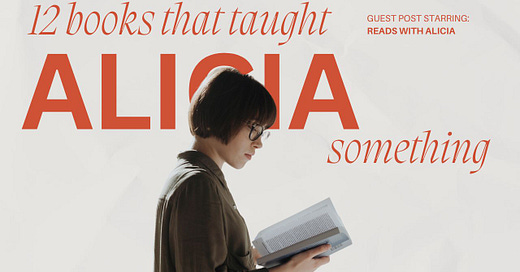12 books that taught Alicia something
A special guest-post from the wonderful Alicia of Reads with Alicia!
hey everyone! today, gracing the halls of Al-bayt Al-Hikmah is the wonderful Alicia from the newsletter Reads With Alicia! she is a lovely person to talk to and she writes some of the best and in depth reviews i have read so far! so without further ado, let her introduce herself in her own words!
Each time I read Arbaaz’s newsletter, I learn something new, whether it’s about disability in Frankenstein, a deep dive into whether Gaia from Greek mythology is a feminist icon, or how Marie Curie studied physics and maths while working as a tutor and governess. So for this guest post, I’m sharing 12 books that taught me something, from historical fiction to investigative journalism.
Most of these books are nonfiction, but some of them are fiction that opened my eyes to parts of history or even the modern world that I was not aware of. Some of these are obvious, like Han Kang’s historical fiction We Do Not Part (though the story itself is revelatory—read more in my full review) but others led me to surprising learnings, like how the innocuous Sweet Bean Paste, largely about a young man and old woman making dorayaki, revealed Japan’s leprosy laws that were in force until very recently.
Bethnal Green by Amélie Skoda
Though Bethnal Green focusses more on the main character Suyin’s personal journey as a Malaysian immigrant in England, it gave me a glimpse into what being a healthcare worker in the NHS in the 1970s was like, including protests to save the Bethnal Green Hospital during austerity measures. Read my full book review here.
Bright Young Women by Jessica Knoll
This book is fiction, but something about it made me wonder if it was based on a true story. It is. Bright Young Women is inspired by the women murdered by the serial killer Ted Bundy, centring their stories and brilliance, instead of the person who ended it.
Cultish: The Language of Fanaticism by Amanda Montell
Many of us, myself included, like to think of ourselves as smart consumers, and that when we consume big brands, we’re just using them because they’re genuinely good value. But how much of that is true? How do these brands settle themselves into our minds, our subconscious, so that they become our defaults and even parts of our identity? These questions are also relevant in a time where celebrity and social media influencers heavily shape our consumption.
Empireland: How Imperialism has Shaped Modern Britain by Sathnam Sanghera
Having grown up in a former British colony, Britain’s imperial past isn’t exactly news to me, but I appreciated learning how this history shaped modern Britain, from the NHS’s foundations to Brexit, and so much more. Empireland demands that Britain understands its past and acknowledge its role in its present, including its identity.
Empire of Pain: The Secret History of the Sackler Dynasty by Patrick Radden Keefe
A friend suggested Empire of Pain for our book club and my goodness, it is long (hello, YC!). I did, however, enjoy it enough to watch two TV series about it (Painkiller on Netflix, and Dopesick on Disney+). Before reading this book, I’d heard mentions of the opioid crisis in the US, and never realised how it all came from one Sackler family. Empire of Pain also highlighted to me just how important a legacy and name is.
The Great Crashes: Lessons from Global Meltdowns and How to Prevent Them by Linda Yueh
With the economy the way it is, I’ve been trying to learn how major economic events played out in the past, and this book was really helpful, balancing the theory that the economy is cyclical with the reality that very often, we live in ~unprecedented times.
NeuroTribes: The Legacy of Autism and the Future of Neurodiversity by Steve Silberman
Over the years, I have read many books by and about disabled people, including much about the history of disability rights in the UK and around the world. However, I tend to focus on physical disabilities, with a massive gap in knowledge about the history of neurodiverse people, and this book filled in some of these. As the book focusses on history (some of which being quite painful) and is fairly medicalised, I welcome suggestions on being neurodiverse in the present day (ideally by neurodiverse authors). I also welcome thoughts from neurodiverse people on this book—I searched for how the community itself perceives this book, but didn’t find much.
Private Revolutions by Yuan Yang
A revelatory portrait of womanhood in modern China through four women, born in the 1980s and 1990s in different socioeconomic classes and regions in mainland China. The book highlights systemic barriers under China’s state economy, including the hukou system and gendered labour practices. The author, Yuan, is a former Financial Times China correspondent and grounds these stories in sharp realism.
The Seven Moons of Maali Almeida by Shehan Karunatilaka
I wish I could say I learned so much about Sri Lankan history, but this book, which won the 2022 Booker Prize, showed me just how little I know. Through a fascinating combination of historical fiction, fantasy, and magical realism, Shehan pushes us through Sri Lanka in the 1990s, in the midst of a brutal civil war. (Thanks, Tim, for this birthday present a few years ago!)
Sweet Bean Paste by Durian Sukegawa
This tender novel about red bean dorayaki led me to research Japan’s leprosy laws and practices, under which people with leprosy were subject to legal discrimination and ill treatment, including forced isolation in sanatoriums, until the main law was abolished in 1996. The Japanese government acknowledged the mistreatment in 2001.
We Do Not Part by Han Kang
The Noble Prize winner Han Kang’s latest historical fiction taught me about the Jeju Uprising and Massacre in the 1940s, which took place after Imperial Japan’s surrender to Allied forces and the end of Japanese occupation of Korea, resulting in an estimated 30,000 deaths (10% of the island’s population). Read my full review of the book, with links to further sources, here.
What My Bones Know: A Memoir of Healing from Complex Trauma by Stephanie Foo
I read The Body Keeps Score by Bessel van der Kolk a few years prior, and where that book set out the medical, scientific things that happen to the body when a person undergoes trauma, this book makes it personal, with Stephanie sharing her own journey with complex PTSD in this memoir. I think these books go hand-in-hand.
Which books, fiction or non-fiction, have taught you something recently? Let us know in the comments!







So many great recommendations here to explore. Empireland is one that I learnt so much from too and Bethnal Green is on my TBR
Love this list, Alicia. Seven moons and We Do Not Part is on my TBR.